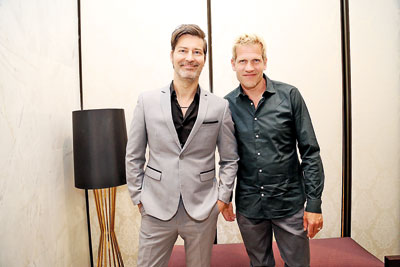Sweetest surprise with MLTR

Pix by Anuradha Bandara
Sometime in the middle of the war between the CD and the Mp3, Jascha Richter feared for the fate of music. “When suddenly we could not sell records anymore, it felt like a disaster for the industry,” says Richter. But , Michael Learns to Rock, the band Richter founded with Mikkel Lentz, Søren Madsen, and KåreWanscherin 1988 has seen – and survived – unimaginable change in the music business. And the end of CDs turned out to be the beginning of a new chapter. However, Richter is the first to admit, it hasn’t been without its challenges: “I think sometimes I have been frustrated by how music sounds today, because it so completely different from what we are doing,” he told Mirror Magazine.
Their music, built around simple melodies and bathed in a kind romantic glow, has stayed much the same. In fact, in a response to a question from a journalist about what made a good song, Richter famously responded: “you have to have a verse and a chorus.”
When the band decided to retire in 2000, and then changed their minds, they rallied to prove there was still a market for their brand of entertainment with the song “Take Me to Your Heart.” A huge hit in China, Hong Kong, Vietnam, Thailand and Taiwan, it became the most downloaded single of the year in 2006.
The band hasn’t had a big break in the decade since, but at their press conference in Colombo last week, MLTR guitarist Mikkel Lentz told fans that Richter had been writing new music and that they hoped to be back in the studio soon. The band seemed pleased to be back in Sri Lanka, their first visit since 2004 when they last took to a stage in Colombo.
Lentz smiled and waved, while Richter sagged a little in his seat, clearly a victim of jet lag. Fielding questions about the most embarrassing thing that has ever happened to them (Lentz says he fell off a stage once), how they have stayed together (they feel like family and handle their disagreements in a mature way) and what they think about Sri Lanka then and now (Lentz says the view out of his hotel room – of the sea – still looks the same), the band evoked laughter from the crowd. It’s clear they are beloved by many here. An entire generation of Asian kids grew up crooning to hits like “Paint My Love,” “Sleeping Child,” and “25 Minutes.” Having sold an estimated 11 million records, a good chunk of which were in Asia, the band’s popularity is a foregone conclusion in this part of the world. It’s why they can be found touring in places like Malaysia, Philippines and India with some regularity.
Somewhat unconvincingly everyone, including MLTR themselves, have attributed their fame on this continent to their clean, scandal-free, squeaky-clean image. It’s far more likely that Asian audiences are just romantics at heart. Reflecting on how his music has evolved over the years, Richter says nothing much has changed. Certainly, the same themes seem to interest him as a writer. He says the change is more personal that professional. The 53-year-old compares aging to standing atop a mountain. “It’s just being able to control everything that’s happening in your life…that’s pretty nice.”

For fans, MLTR’s faithfulness to genre and style is utterly reliable. They’ve even remained relatively unaffected by all their time in Asia. “The music style is still the same,” says Lentz. “I think Asia has influenced us more on a personal basis. Everybody should try what we have tried. It’s been quite fantastic. The first time we came to Asia, we were at the beginning of our twenties. My view of the world was pretty narrow. I only knew Danish and Scandinavian culture, so it was really opening up my mind. Asia has become my second home.”
They’ve been touring for a long time, and with hits that date back to the 90s, you’d imagine keeping things fresh, delivering their songs with all the passion and feeling they were written to convey must have become a challenge. “It’s quite easy, because every time people sing along with our songs, the atmosphere comes by itself,” says Richter. “We don’t think that we have been placing this song 7,000 times before. Every concert is almost like our first concert that way.” Lentz agrees: “Yeah, the magic in connecting with our fans is still fantastic. If you do something that makes people feel good, and they smile, it doesn’t get better.”
As for the fears with which we began this article, Richter feels time has vindicated him. Despite all the tumult and the challenges, he’s excited to still be in the music business. “It took a long time for the industry to adapt to this new situation. After all these years, I think now it doesn’t really matter because people are still coming to our concerts.”


